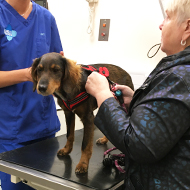
An award-winning chocolatier has teamed up to spread the message.
National pet charity Blue Cross has collaborated with Paul A Young, an award-winning chocolatier, to remind pet owners of the danger that chocolate can pose to pets this Easter.
Paul A Young, chocolatier, pâtissier and television personality, urged pet owners to keep chocolate away from pets: “Chocolate is of course a big part of my life, and so is my beloved dachshund Billi - but very importantly, the two must always be kept apart!
“With Easter coming up I want to remind those with dogs and cats, that while us humans are looking forward to eating our delicious Easter eggs, chocolate must never be given to our pets.
“By ensuring that all chocolate eggs and treats are kept well out of their reach, everyone can enjoy a safe and happy Easter together.”
Blue Cross shared a link to advice on chocolate, and Caroline Reay, head of Veterinary Services at Blue Cross, said: “Whilst it is a delicious treat for humans, chocolate can be extremely toxic to cats and dogs and should never be fed to them.
"It contains a chemical, theobromine, which is a bit like caffeine and is toxic to dogs and cats.
“As a general rule, the darker the chocolate, the higher the levels of theobromine become. It really is best to avoid your pets getting access to any sort of chocolate.
"If you have seen your pet eat something that they shouldn’t, don’t wait for symptoms to appear. Call your vet immediately and ask for their advice.”
Images (C) Blue Cross



 The Veterinary Medicines Directorate (VMD) is inviting applications from veterinary students to attend a one-week extramural studies (EMS) placement in July 2026.
The Veterinary Medicines Directorate (VMD) is inviting applications from veterinary students to attend a one-week extramural studies (EMS) placement in July 2026.